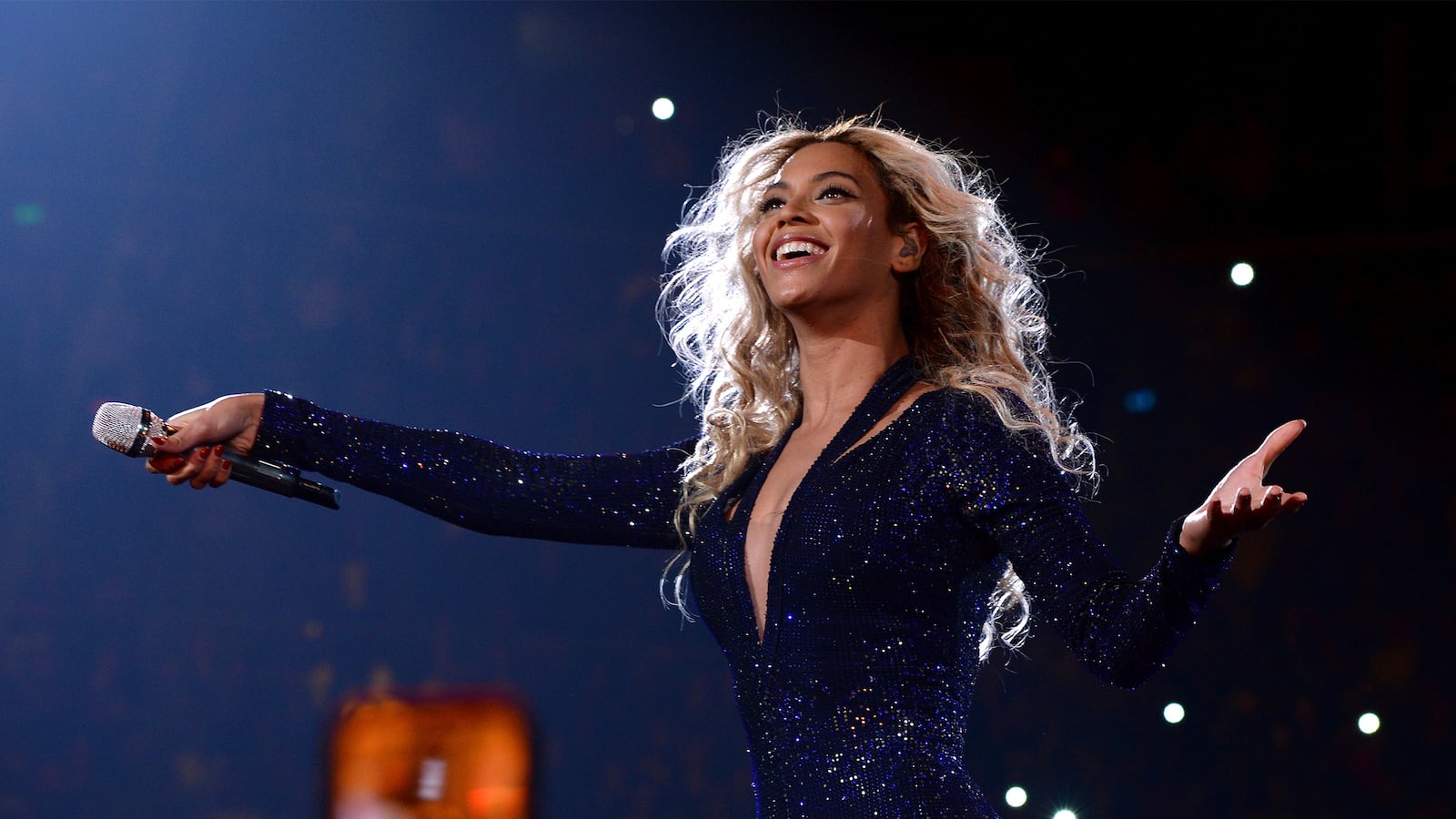Beyoncé is many things: an unofficial Red Lobster spokeswoman, an incomparable pop star, a feminist, a keen critic and observer of race relations in America, and—most likely—your current iPhone background. She’s also a public relations genius.
On Saturday, Beyoncé flipped a middle finger at your going-out plans AND her husband with Lemonade. The hour-long visual album, which debuted at 9 p.m. and was available for the next 24 hours on HBO, ushered in a day of reckoning. Eleven brand new Beyoncé tracks later, Jay Z was put on blast, Beckys around the world went into hiding, and GIFs of Serena Williams twerking taught Kim K a thing or two about breaking the Internet. Lemonade isn’t the first time Beyoncé has changed the game, exhibiting a level of control, artistic autonomy, and pop culture prowess unheard of in the digital era.
Beyoncé doesn’t just run the news cycle, she runs the fricking world.
For other artists, the album is dead. In fact, music journalists have long been reporting from a post-album era. Luckily, Beyoncé doesn’t really seem to care. In 2014, she essentially danced on the grave of the album in a series of increasingly elaborate lingerie sets. I speak, of course, of Beyoncé, Queen Bey’s first foray into the visual album (a concept that she more or less invented). On Dec. 13, 2013, the world woke up to an entire, 14-track album. This was an unprecedented PR move, mainly because absolutely no PR was involved. Despite a complete absence of early promotion—or even a warning—Beyoncé managed to sell 828,773 digital copies in three days. Thus began a new era of Bey not just changing, but essentially creating the game.
The music industry has no choice but to enable Beyoncé’s OCD tendencies—she’s just that important, and that good. Back in May 2015, Beyoncé’s publicist told The New York Times that Beyoncé had not answered a direct interview question in over a year. By refusing to surrender any portion of her narrative to a journalist’s prying word processor, Bey maintains total control over her story. Everything we know about her—from her HBO documentary to her vacation photos—is processed, edited, and curated by Bey and Bey alone. While other celebrities may purport to want privacy, few have the innate cultural relevancy that affords Beyoncé the right to eschew any and all forms of predatory media. And we’re not just talking about TMZ here.
For their all-important September 2015 issue, Vogue decided to put Beyoncé on the cover. So did the pop star break her vow of silence for the most important annual issue of the most iconic fashion magazine in the world? Nope. Other stars might kill for a cover story in Anna Wintour’s bible, but Beyoncé was confident in the knowledge that her mere image, the intimation of her presence and approval, is invaluable. In 2015, a silent Beyoncé is more captivating than any of her agreeably chatty peers. As Yale professor Daphne A. Brooks told The New York Times, “She’s been able to reach this level of stardom in which she’s managed—in a way that I really think is unique even among other black women entertainers—hyper-visibility and inaccessibility simultaneously.”
Beyoncé refuses to surrender the “hard-won privilege” of her privacy. Lemonade is being lauded for its intimacy, the bold and painfully candid admissions with which Beyoncé cuts herself open, offering the organs and heart of her marriage as material for her creative process and sustenance for her fans. However, it’s important not to confuse this performance of intimacy with total honesty, or the surrender of any degree of control. Beyoncé is pre-packaging the story of her husband’s infidelity, manufacturing it as an art piece that then feeds directly into her pocket. Miraculously, Beyoncé’s meticulous fabricating in no way distracts from the visceral power of her message. Lemonade has already proven itself to be a lifeline for fans, particularly black women, who have been plagued by the emotions and phenomena that Beyoncé articulates.

There’s a reason why Beyoncé didn’t speak out after (or during) elevatorgate. When rumors of infidelity and marital woes in the Carter-Knowles household reached a natural Internet apex, Beyoncé didn’t break down crying on Oprah. Jay Z wasn’t caught by the paparazzi checking into a luxury hotel. Instead, Beyoncé stalled; she played pretend, uploading an Instagram—her only social media indulgence—of Jay cavorting with Blue Ivy. Even as we enter our fourth day after Lemonade, Jay is still artfully lying low. The message is clear: This is Beyoncé’s story, and she’s not gonna let an unfortunate security leak like the elevator footage or a pesky cheater like her husband steal the spotlight.
Even more genius than Jay Z’s invisibility was his unexpected presence on Lemonade.
First things first—I personally cannot fathom the levels of power and persuasion necessary to convince your husband to appear next to you in an album that acts as a paean to his trifling nature and general stupidity. People have cited Jay Z’s Lemonade cameo (and tacit approval) as proof that the many infidelities that Beyoncé outlines throughout the visual album are metaphorical; if not totally fictitious, at least exaggerated. In our celebrity romance-obsessed culture, a high-profile celebrity affair is extremely scintillating. Add to that the fact that Bey and Jay are one of the most A-list pairings of all-time, and you’ve got a story with the nuclear potential of Bennifer’s nanny raised to the power of a Selena Gomez-Justin Bieber sex tape. This conspiracy theory is substantiated by the fact that Lemonade was exclusively released on Tidal, the music streaming service that Jay Z co-owns. So in essence, Beyoncé is making her husband a lot of money (and a whole mess of vital Tidal traffic) with her earth-shattering album about her cheating husband. That’s one step above PR mastermind, positioning Beyoncé in the even more elusive firmament of PR Machiavellis.






